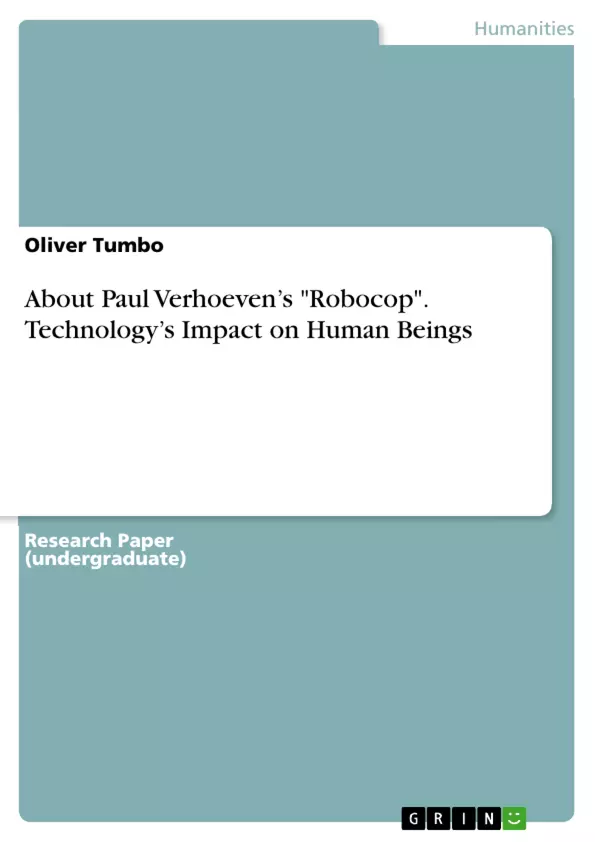Paul Verhoeven’s Robocop is a science-fiction that highlights the societal concerns of America in the 1980s. The film depicts a futuristic Detroit setting that experiences a soaring crime and economic slump. Robocop is a captivating narration about the life of an assassinated police officer, Alex Murphy, who is restored to life as a cyborg to enforce the law for the benefit of a corrupt organization. The film encompasses many things that concern humanity, thus making this moving picture relevant to this day. On the one hand, the movie might be a Christian tale of the Resurrection that is disguised as science fiction. On the other hand, this film is an exploration of the human identity in a period of swift technological advancement since it also demonstrates a philosophical perspective on the nature of humans.
Inhaltsverzeichnis (Table of Contents)
- Introduction
- The Portrayal of Technology in the Film
- How the Film Defines What Constitutes Humanity
- The Depiction of Technology as a Philosophical Perspective on Human Nature
Zielsetzung und Themenschwerpunkte (Objectives and Key Themes)
The movie Robocop, directed by Paul Verhoeven, explores the societal concerns of 1980s America, specifically focusing on the ramifications of rapid technological advancement on human identity and the complexities of a future dominated by technology.
- The Impact of Technology on Human Identity
- The Fear of Technological Replacement and Dehumanization
- The Critique of Capitalism and its Influence on Technology
- The Role of Technology in Shaping Human Values and Experiences
- The Potential for Both Utopian and Dystopian Futures in a Technologically Advanced World
Zusammenfassung der Kapitel (Chapter Summaries)
- Introduction: This section introduces the film Robocop, setting the scene in a dystopian future where technology plays a crucial role. It highlights the film's relevance as a commentary on the human condition in the face of rapid technological change.
- The Portrayal of Technology in the Film: This chapter analyzes how Robocop portrays technology, specifically the creation of cyborgs and the potential for their integration into society. It discusses the film's depiction of fear surrounding technological advancements and the potential for a future dominated by machines.
- How the Film Defines What Constitutes Humanity: This section explores how Robocop defines humanity in a technologically advanced world. It discusses the film's depiction of the decline of human emotions and the blurring of lines between human and machine. The chapter also analyzes the cyborg's struggle to maintain a sense of self and identity in a world dominated by technology.
- The Depiction of Technology as a Philosophical Perspective on Human Nature: This chapter explores Robocop's critique of capitalism and its role in shaping technological advancements. It analyzes the film's portrayal of technology as a tool that can be used for both good and evil and discusses the dangers of overreliance on technology. The chapter also delves into the film's warning against technicism and its potential to dehumanize society.
Schlüsselwörter (Keywords)
Robocop, technology, cyborg, human identity, dehumanization, capitalism, technicism, dystopian future, postmodernism, simulation, human nature, fear, alienation, societal concerns, rapid technological advancement, futuristic Detroit.
Frequently Asked Questions
What societal concerns does Paul Verhoeven’s Robocop address?
The film reflects 1980s American concerns about soaring crime, economic slump, rapid technological advancement, and corporate corruption.
How does Robocop define "humanity"?
The film explores humanity through Alex Murphy's struggle to reclaim his identity and emotions after being turned into a law-enforcing cyborg.
Is Robocop a critique of capitalism?
Yes, it critiques how corporations use technology for profit and control, often leading to the dehumanization of society and the individual.
What is "technicism" in the context of the film?
Technicism is the overreliance on technology to solve social problems, which the film warns can lead to a dystopian future where machines replace human values.
How is the "Resurrection" theme used in Robocop?
The story can be seen as a Christian tale of resurrection disguised as science fiction, where Alex Murphy is "restored to life" as a cyborg savior.
- Arbeit zitieren
- Oliver Tumbo (Autor:in), 2020, About Paul Verhoeven’s "Robocop". Technology’s Impact on Human Beings, München, GRIN Verlag, https://www.grin.com/document/966974



